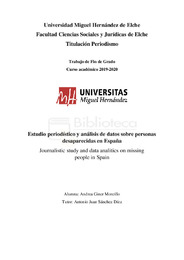Por favor, use este identificador para citar o enlazar este ítem:
https://hdl.handle.net/11000/27184Registro completo de metadatos
| Campo DC | Valor | Lengua/Idioma |
|---|---|---|
| dc.contributor.advisor | Sánchez Díez, Antonio Juan | - |
| dc.contributor.author | Giner Morcillo, Andrea | - |
| dc.contributor.other | Departamentos de la UMH::Ciencias Sociales y Humanas | es_ES |
| dc.date.accessioned | 2022-05-18T09:29:12Z | - |
| dc.date.available | 2022-05-18T09:29:12Z | - |
| dc.date.created | 2020-06-19 | - |
| dc.identifier.uri | http://hdl.handle.net/11000/27184 | - |
| dc.description.abstract | En el presente trabajo se realiza un estudio periodístico sobre las personas desaparecidas sin causa aparente en nuestro país, los recursos con los que cuenta el Estado para combatir las desapariciones, sus oportunas mejoras, y las posibles causas de la desaparición. Se examinan y analizan numerosos datos que aporta el Ministerio del Interior en su Informe Anual sobre Personas Desaparecidas. La estadística analizada sugiere que España todavía no cuenta con las herramientas necesarias para hacer frente al número de personas que actualmente siguen en paradero desconocido. De igual manera, se observa que las empresas de comunicación, a pesar de que son un mecanismo relativamente joven en las desapariciones, tienen un papel cada vez más importante, además generan un desplazamiento de las masas que debería ser utilizado de una manera más adecuada, interviniendo siempre imparcialmente. Se concluye afirmando que si se le otorga una cantidad adecuada de presupuesto a las instituciones que intervienen en la investigación, se forman de manera periódica, y mejoran la coordinación y colaboración entre ellas, nuestro país prosperará en materia de desapariciones y les dará a las familias de las personas desaparecidas las respuestas que se merecen. | es_ES |
| dc.description.abstract | In this work, a journalistic study is carried out on the disappeared persons without apparent cause in our country, he means that the State has to combat disappearances, their opportune improvements, and the posible causes of the disapperance. Numerous data provided by the Ministry of the Interior in its Annual Reporto n Missing Persons are examined and analyzed suggests that Sapin does not yet hace the necessary means to cope with the number of people who are currently still unaccounted for. Likewise, it is observed that the media hace an important role, since they generate a dispacement of the masses that should be used in a more adequate way, alwais intervening impartially. It concludes by stating that if the institucions involved in the investigation are given an adequate amount of Budget, they are formed periodically, and they improve coordination and collaboration among them, our country Will prosper in the matter of disappearances and will give families of missing persons the answer the deserve. | es_ES |
| dc.format | application/pdf | es_ES |
| dc.format.extent | 49 | es_ES |
| dc.language.iso | spa | es_ES |
| dc.publisher | Universidad Miguel Hernández de Elche | es_ES |
| dc.rights | info:eu-repo/semantics/openAccess | es_ES |
| dc.rights.uri | http://creativecommons.org/licenses/by-nc-nd/4.0/ | * |
| dc.subject | investigación | es_ES |
| dc.subject | estudio periodístico | es_ES |
| dc.subject | persona desaparecida | es_ES |
| dc.subject | cuerpos de seguridad | es_ES |
| dc.subject | medios de comunicación | es_ES |
| dc.subject | investigation | es_ES |
| dc.subject | journalistic study | es_ES |
| dc.subject | missing people | es_ES |
| dc.subject | security forces | es_ES |
| dc.subject | social media | es_ES |
| dc.subject.other | CDU::0 - Generalidades.::070 - Periódicos. Prensa. Periodismo. Ciencias de la información | es_ES |
| dc.title | Estudio periodístico y análisis de datos sobre personas desaparecidas en España | es_ES |
| dc.title.alternative | Journalistic study and data analitics on missing people in Spain | es_ES |
| dc.type | info:eu-repo/semantics/bachelorThesis | es_ES |

Ver/Abrir:
TFG-Giner Morcillo, Andrea.pdf
3,02 MB
Adobe PDF
Compartir:
 La licencia se describe como: Atribución-NonComercial-NoDerivada 4.0 Internacional.
La licencia se describe como: Atribución-NonComercial-NoDerivada 4.0 Internacional.
.png)